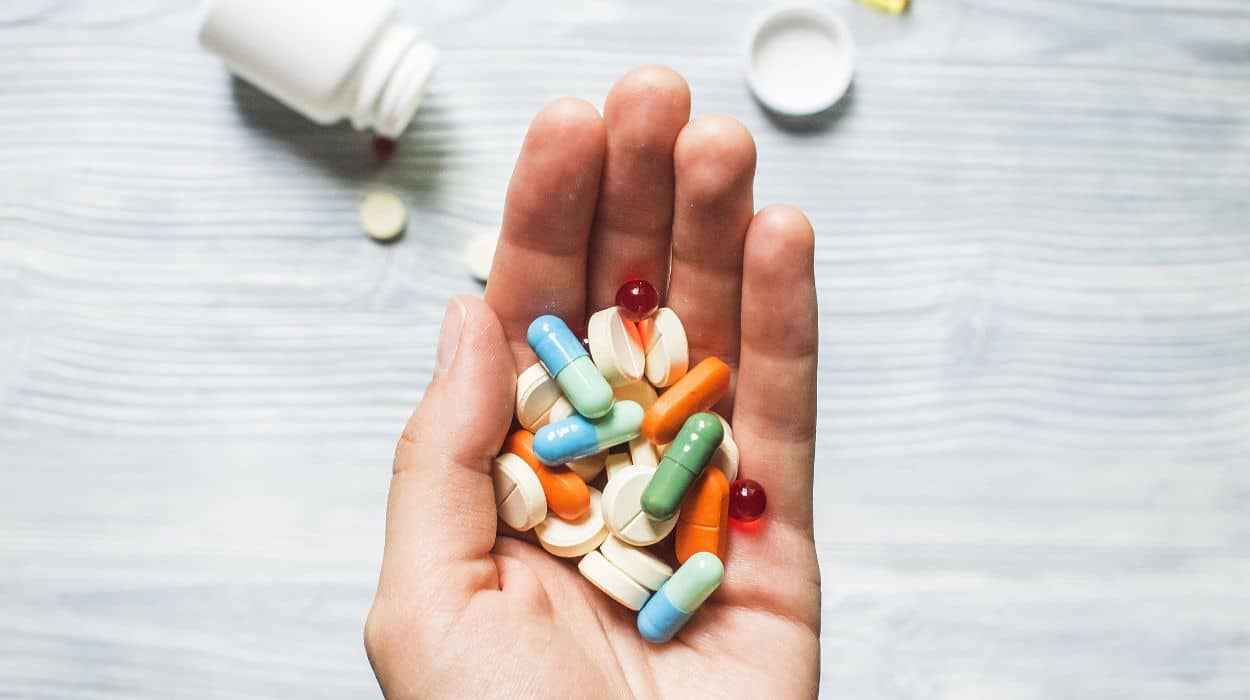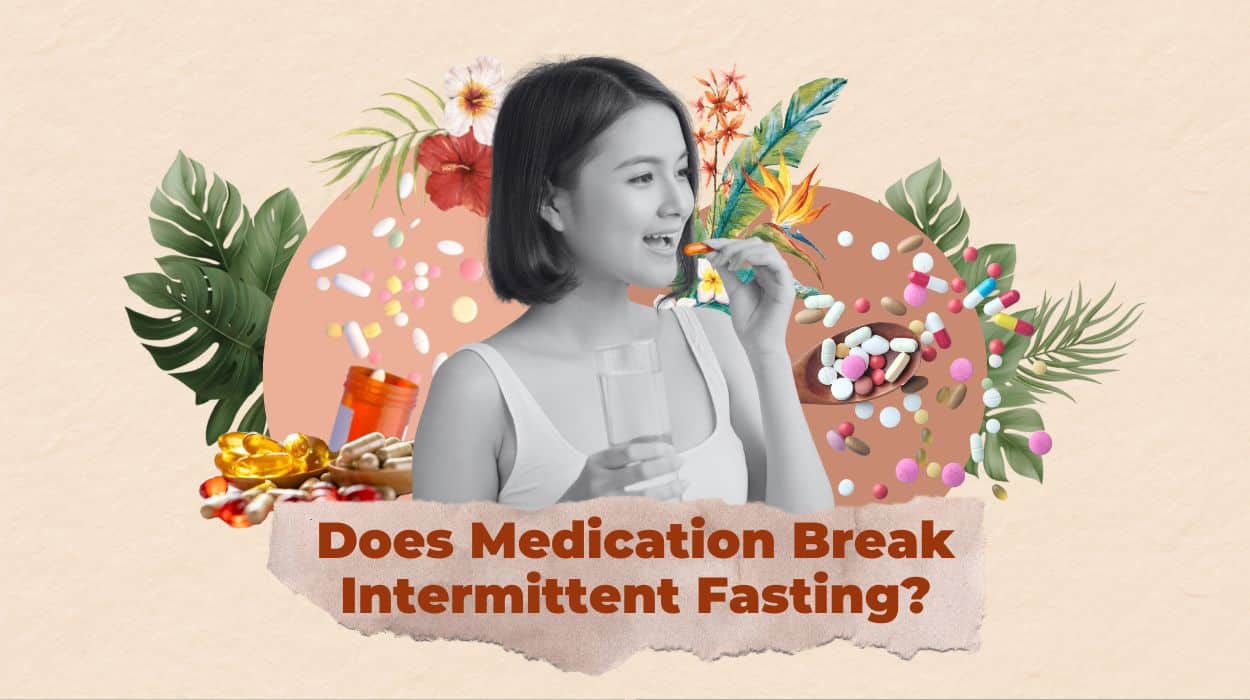Intermittent fasting has become a very popular diet plan that many people are using as a tool for weight loss and as a significant part of their healthy lifestyle.
Due to the increase in the number of people who are overweight or obese,[1] intermittent fasting can be a great tool to use to prevent various ailments associated with obesity and enhance health benefits. Intermittent fasting is a pattern of eating that cycles between an eating and fasting window. Working out while intermittent fasting can also help with weight and promote health.
However, when it comes to medication, does taking medication break intermittent fasting, the pounderance that we will be exploring? While most medications are calorie-free and will not break the fast, the food requirements or lack of food when taking the medication and its timing is something that needs to be approached with caution.
Does Medication Break Intermittent Fasting?
The short answer is no. As long as the medication itself is calorie-free then it will not break the fast. However, it is important to note that certain medications need to be taken with food, while others are best to be taken when fasting and in between meals.
Does Medication Break A Fast?

Intermittent fasting is a unique diet plan that raises many questions. During the fasting period, one is to avoid all consumption of food, however, the question of what can you drink while intermittent fasting often comes up. As long as the drink contains zero calories, it will not break the fast. It is recommended that women consume about 2.2 liters and men consume 3 liters per day of fluid.[2]
And does medication break your fast? There are a multitude of medications prescribed that have an interaction when taken with food or are needed to be taken with food to avoid side effects. Certain medications can be harmful to the stomach lining when they are taken without food. In addition, other medications can have reduced bioavailability when taken with food and therefore the preferred method of consumption is on an empty stomach.
For example, if one is suffering from diabetes and needs insulin and other diabetes medications, then the intermittent fasting schedule needs to be adjusted to accommodate. Intermittent fasting for diabetes can be an option, however, it requires planning. Often the use of diabetes medications is dependent on the amount of carbohydrates that are consumed during a meal. Injection of insulin without any carbohydrates consumed can lead to too low blood sugar levels.
When it comes to those with cardiovascular diseases and elevated blood pressure, being on an intermittent fasting diet can lower blood pressure. Asking oneself does taking blood pressure medication breaks your fast is an important one to focus on.
During extended fasting, blood pressure tends to decrease, therefore, if one is on blood pressure medications during the fast, it is advisable to not take the medication at that time as the medication can further reduce blood pressure resulting in various adverse effects.
For those taking antibiotics, it is advisable to either take them with food or just before a meal, to avoid digestive system issues. The same is true for those on antidepressant medication since antidepressants can cause various gastrointestinal issues and are best taken with food.
Does Taking Vitamins Break A Fast?

Since vitamin supplements are calorie-free, taking them during a fast will not break your fast. However, taking certain vitamins on an empty stomach can cause some gastrointestinal problems including absorption issues.
Fat-soluble vitamins (Vitamins A, D, E, and K) are best absorbed when taken with a meal containing fat. Certain water-soluble vitamins (Vitamin C, and various B vitamins) are best absorbed in water and for the most part, can be taken on an empty stomach. Vitamin C can, however, cause some digestive issues due to its acidity and therefore is best taken with food.
Medications That Are Safe To Take During Intermittent Fasting
Certain over-the-counter drugs such as pain medications including NSAIDs[3] (Non-steroidal anti-inflammatory drugs) can be taken on an empty stomach.
There are also certain prescription medications such as thyroid medications that are predominantly used for under-active thyroid function (hypothyroidism) that are required to be taken on an empty stomach and therefore are safe to take during the fasting routine.
Iron supplements are generally safe during fasting to enhance absorption, but some individuals may experience gastrointestinal issues when taking them on an empty stomach. The method of taking iron depends on the patient.
Conclusion
Intermittent fasting has many health benefits for people who want to lose weight, prevent obesity, maintain blood sugar, and decrease insulin sensitivity. There are many benefits to fasting diets, even just from fasting for a few hours.
However, it is important to work with a medical professional when embarking on extended fasting periods. Your medication regimen can determine whether certain medications will break your fast. Those who are on a supplement routine can usually continue with their intermittent fasting diet.
Individuals with cardiovascular diseases or insulin-resistant diabetes should exercise caution when following an intermittent fasting diet, as some medications for heart disease and diabetes require consumption with meals. Those who want to start an intermittent fasting diet plan should conduct some research.
Frequently Asked Questions
Certain vitamins such as fat-soluble vitamins should be consumed with foods that contain fats, however, the vitamin itself will not break the fast. Water-soluble vitamins can be taken with water, therefore, as long as the beverage is calorie-free, the water-soluble vitamin will not break the fast.
Yes, however, it is important to speak with a medical professional before starting this diet since periods of fasting can cause low blood sugar and if insulin is taken during that time it can be too much insulin and blood sugars that are too low.
Yes, as long as the antibiotic is taken as prescribed and coincides with the fasting window and eating window.
Most thyroid medications can be taken on an empty stomach, therefore they will not break a fast and those with altered thyroid issues can take part in the diet plan. It is always advisable to consult with a medical professional since prolonged periods of fasting can affect thyroid function.
Yes, the diet plan can still be utilized, however, it is advisable to speak to a medical professional before starting any diet plan. Antidepressants can sometimes cause gastrointestinal issues such as nausea and it is recommended that the medication is taken with food. However, one can work with a medical professional regarding the timing of the medication and how it fits in with the eating and fasting windows within the diet plan.
 Expert's opinion
Expert's opinion
